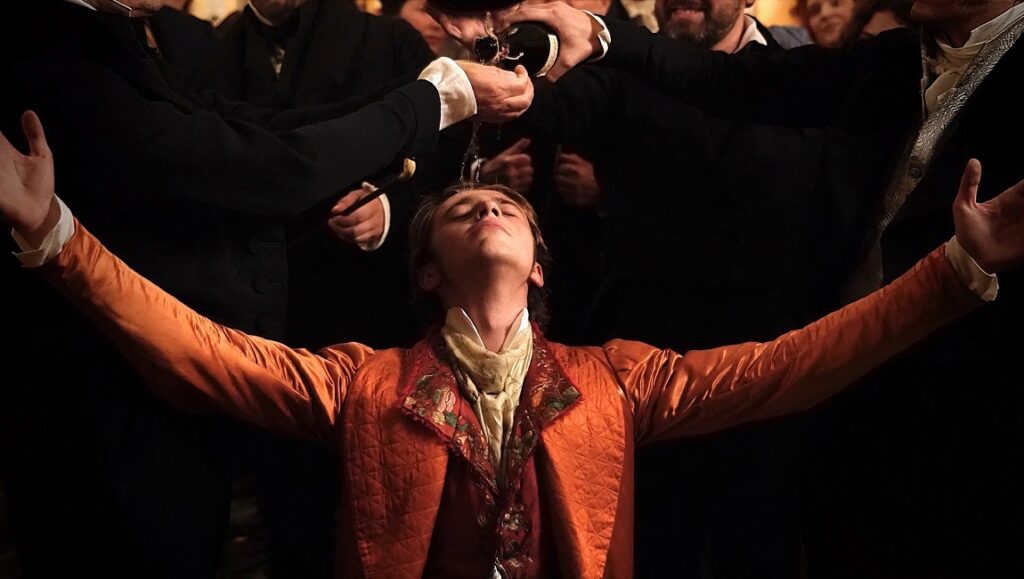Lost Illusions is a lush, ravishing work that avoids the lethargy and empty aesthetics of so many literary adaptions and fully embodies the spectacle of Balzac’s source material.
For anyone who’s even mildly familiar with the grandeur and delicacy of 19th-century French writer Honoré de Balzac, one reflected in his epically scaled, multi-volume novel sequence The Human Comedy, and perhaps most explicitly in his Illusions perdues, the prospect of any adaptation can fairly feel dubious from the beginning. The reason is simple: the elaborate, intricate realism of the author’s literary style doesn’t easily lend itself to an on-screen treatment without inherently sacrificing much of the majesty, mystery, depth, and charm of the original. Yet another trouble to be found in adapting Balzac’s work — specifically, his better-known writings delivered in long novel format — for any filmmaker would be to deliver anything that feels personally interpreted or artistically fresh without such a work being utterly overshadowed by the immensity of the original material. That said, it’s quite impressive to find that Xavier Giannoli’s Lost Illusions is a very ambitious adaptation that manages to successfully achieve and execute many of these defining qualities.
Indeed, ambition is a crucial trait in Lost Illusions, and for its 20-year-old protagonist, Lucien de Rubempré (Benjamin Voisin), too: an amateur, youthful poet and printmaker who travels from Angoulême to Paris with his protectress — Madame Louise de Bargeton (Cécile de France), with whom he’s conducting a passionate affair — in order to pursue his dreams of becoming a writer and subsequently climb the social ladder. Obviously, at the heart of the chaotic and rowdy Bourbon Restoration-era Paris, things won’t go as smoothly for Lucien as he had hoped and planned. And when Madame Bargeton soon leaves him penniless and inconsolable due to his lower-class status, Lucien finds himself on a course that would see him met with various encounters and situations — most notably, with Vincent Lacoste’s Étienne Lousteau, Xavier Dolan’s Nathan, Salomé Dewaels’ Coralie, and a pair of stellar cameos from Jeanne Balibar as Marquise d’Espard and Gérard Depardieu as Dauriat — while navigating a complicated network of elite social circles, high-class salons, stunt journalism, spectacle, scandal, sybaritism, and deception where everything seems to be tightly and alternately controlled, constructed, or destroyed by capital and media.
Giannoli’s Lost Illusions, then, in full fidelity to its source material, presents a social satire depicting a time of vertiginous change in a world that appears to be without morals or limits. The film dedicates itself to delineating the disillusionment that Lucien feels as his youthful romanticism and provincialism abut a reality far more cynical: carnal desires give way to tragic enlightenment, mischief to viciousness, sin to deliverance. But in executing this virtuoso vision, Giannoli most impresses by maintaining complete and precise control of every element — whether its the camerawork (Christophe Beaucarne), his direction of actors, or the lush costuming (Pierre-Jean Larroque) and set designs (Riton Dupire-Clément) — and Lost Illusions never once comes across as your typical costume drama nor ever feels burdened by the usual lethargy that afflicts so many period adaptions. Instead, what Giannoli does is form a very literary mise-en-scène, employing an artistic approach similar to the singular visions of filmmakers like Jacques Rivette and Alexandre Astruc. Giannoli never fails to imbue the film with his witty, joyful humor in building this Balzacian human comedy, managing a kind of peculiar perfectionism of form that is rife with liberation and epiphany, a welcome texture that sets the director’s work far apart from what may be wrongly dubbed “tradition de qualité” or “cinéma de papa.”
Which is all another way to say that Giannoli’s film perfectly reflects Balzac’s spirit in an innovative and modern fashion: translating the fast-paced fluctuations of the epoch’s frenzied Parisian lifestyle into a joyous, rhythmic montage of multi-colored and multi-layered shots and sequences (for which editor Cyril Nakache deserves particular praise). Likewise bold is the sonic character of the film: utilizing a melange of various insert shots, voiceover, and extended dialogues, Giannoli constructs his elaborate adaptation atop the constant use of a number of classical pieces (mostly Vivaldi and Schubert), building a film of pronounced musicality, a dance between images and words. It’s a dynamic approach that combines various art mediums to form a ravishing work, simultaneously realistic, poetic, and fantastic, influenced by 19th-century classicism while still managing to feel distinctly contemporary. But one shouldn’t regard Giannoli’s Lost Illusions as a mere indulgence or empty beauty. Although it’s true that the lush production design aptly realizes the atmosphere and zeitgeist of Balzac’s novel, and also in a way reflects the vanity of a highbrow Parisian society that indulged post-Revolution oblivion, such aesthetic character is crucial to the pivotal notion of beauty itself here; after all, Lucien is introduced as a character “who believes in the love of beauty.” And so, Giannoli’s aspiring cinematic symphony must be considered for how successfully it fleshes out this love of beauty. In this regard, Lost Illusions is a powerful, imaginative work, capturing and articulating a concept of beauty that, if not quite lost today, often seems only a specter of the past’s vibrancy. Giannoli’s film is a thrilling reminder — and example — of its continuance.


Comments are closed.